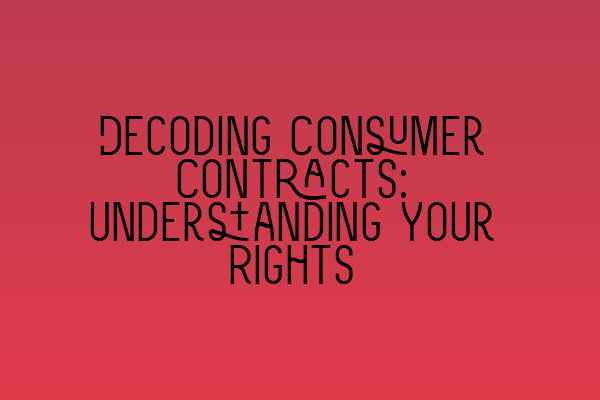Decoding Consumer Contracts: Understanding Your Rights
Welcome to our blog post on decoding consumer contracts and understanding your rights. Consumer contracts are an essential part of our daily lives. From buying groceries to signing up for a mobile phone plan, we enter into contracts with companies on a regular basis. However, these contracts can often be overwhelming and filled with legal jargon that makes it difficult for consumers to understand their rights and obligations.
At SQE Contract Law, we believe that knowledge is power. It’s important for consumers to have a clear understanding of what they are agreeing to when signing a contract. In this blog post, we will guide you through the process of decoding consumer contracts, giving you the confidence to make informed decisions.
Understanding Consumer Rights
Before we dive into decoding consumer contracts, it’s crucial to understand your rights as a consumer. The law provides certain protections to consumers when entering into contracts with businesses. These rights are in place to ensure fair and transparent transactions.
In the United Kingdom, consumer rights are governed by the Competition and Markets Authority (CMA), which enforces consumer protection laws. The rights provided to consumers include:
- The right to clear and transparent information about goods or services
- The right to goods and services that are of satisfactory quality
- The right to a reasonable price for goods and services
- The right to protection against unfair terms and conditions
- The right to a cooling-off period for certain types of contracts
- The right to a remedy if goods or services are faulty or do not meet expectations
By understanding these rights, you can enter into contracts with confidence, knowing that you are protected by the law.
Decoding Consumer Contracts
Now that we have a solid foundation of consumer rights, let’s move on to decoding consumer contracts. Here are some key steps to follow:
Read the Contract Carefully
The first and most important step is to read the contract carefully. Take the time to go through each clause and term, paying close attention to any fine print. Make sure you understand all the obligations, rights, and potential costs associated with the contract.
If you come across any unfamiliar terms or phrases, look them up or seek legal advice. It’s vital to have a clear understanding of the contract before signing.
Identify Key Clauses
Once you have read the contract, identify the key clauses that impact your rights as a consumer. These clauses often relate to payment terms, termination conditions, warranty information, and dispute resolution mechanisms.
Understanding these key clauses will give you a clear picture of what you can expect from the contract and how your rights are protected.
Seek Legal Advice if Required
If you have any doubts or concerns about the contract, it’s always a good idea to seek legal advice. A solicitor specializing in contract law can review the contract, explain any complex clauses, and ensure that your rights are adequately protected.
At SQE Contract Law, we offer professional SQE 1 Preparation Courses and SQE 2 Preparation Courses to help you develop a deeper understanding of contract law and consumer rights.
Taking Action: Enforcing Your Rights
Once you have a clear understanding of your rights as a consumer and have decoded the contract, it’s important to know how to enforce those rights if a dispute arises. Here are some steps to consider:
Communicate with the Other Party
If you encounter any issues or believe that your rights under the contract are being violated, start by communicating with the other party. Clearly explain your concerns and propose a resolution.
It’s often helpful to refer to the specific clauses and terms in the contract that support your position. Effective communication can often resolve disputes without the need for legal action.
Review Dispute Resolution Mechanisms
Contracts usually include dispute resolution mechanisms such as mediation, arbitration, or court proceedings. Be aware of these mechanisms and understand the steps required to escalate a dispute if informal communication fails.
If the contract includes a mandatory arbitration clause, seek legal advice to understand the implications and decide the best course of action.
Seek Legal Assistance
If informal communication and dispute resolution mechanisms fail to resolve the dispute, it may be necessary to seek legal assistance. Engaging a solicitor who specializes in contract law can help you navigate the legal process.
Our team at SQE Contract Law is experienced in handling consumer contract disputes and is well-versed in the relevant laws and regulations. We can provide you with the guidance and representation you need to protect your rights.
Conclusion
Decoding consumer contracts and understanding your rights is essential for making informed decisions and protecting yourself as a consumer. By following the steps outlined in this blog post and having a clear understanding of your rights, you can navigate consumer contracts with confidence.
Remember, if you need assistance with decoding consumer contracts or resolving a dispute, our expert team at SQE Contract Law is here to help. Contact us today for professional legal advice and support.
Related Articles:
